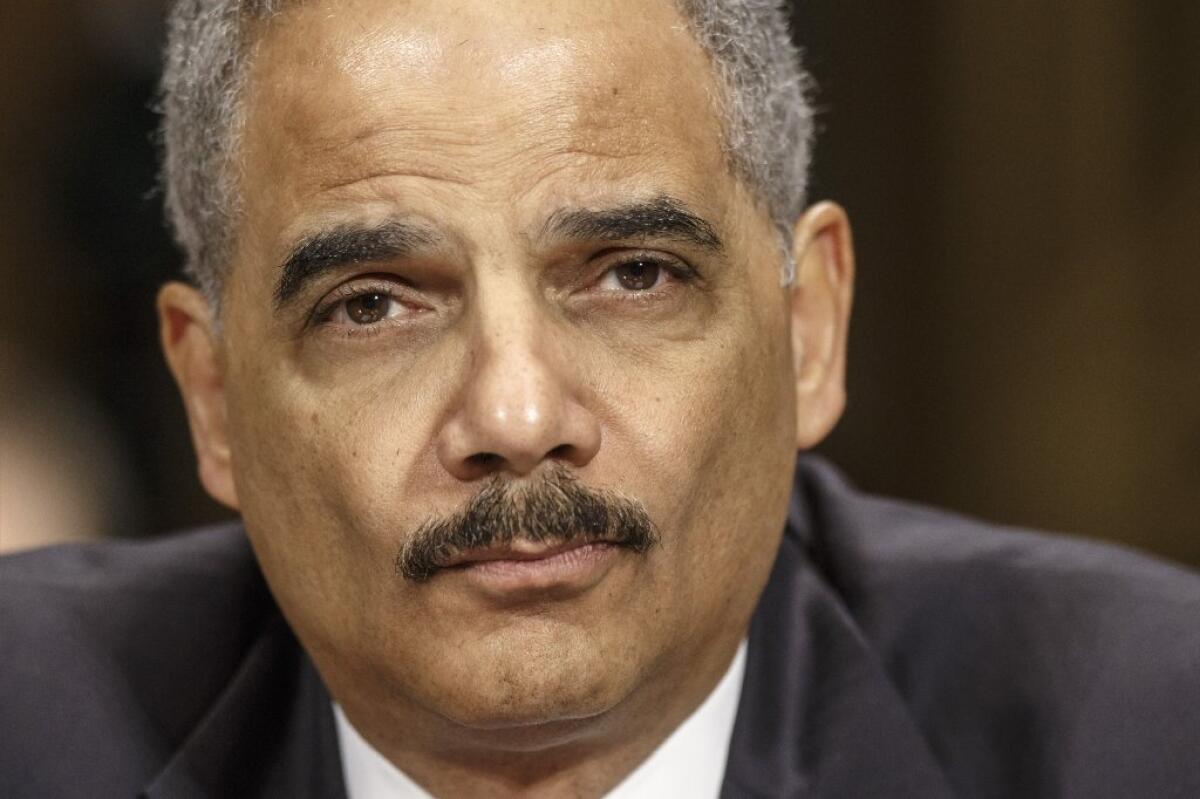In the Tsarnaev case, a bum rap against Holder on the death penalty

- Share via
Is Atty. Gen. Eric H. Holder Jr. a coward because he decided to seek the death penalty for accused Boston Marathon bomber Dzhokhar Tsarnaev?
That’s the charge leveled by Washington Post columnist Richard Cohen. Noting that Holder is personally opposed to capital punishment, Cohen jumps to the conclusion that the attorney general must have been bullied into asking for the ultimate punishment by President Obama or subordinates in the Justice Department. “Or,” Cohen asks suggestively, “was he reluctant to stand up against charges that he is soft on terrorism?”
If you oppose capital punishment in every circumstance, as The Times’ editorial board does, Holder’s decision is disappointing. But it’s not evidence of cowardice or hypocrisy.
EDITORIAL: Boston Marathon bombings: The death penalty still isn’t appropriate
True, the Associated Press reported that in a recent speech Holder said that he was “personally opposed” to the death penalty. But the reasons cited were inadequate resources for capital case defendants and the possibility of miscarriages of justice. Neither problem seems relevant to the Tsarnaev case. As Pete Yost of the AP noted: “One of the finest death penalty attorneys in the country, Judy Clarke, is leading the legal team defending Tsarnaev.” And mistaken identity doesn’t seem to be an issue.
But suppose Holder personally opposed capital punishment even in cases where there was no shortage of defense resources or possibility of error. As attorney general, he is still obliged to enforce the law as it exists.
Yes, he has the discretion not to seek the death penalty. But that discretion extends only to deciding whether a particular crime is heinous enough to justify death given the larger assumption of the law that capital punishment is sometimes appropriate. Saying no to the death penalty in every case because of blanket opposition isn’t exercising discretion; it’s the opposite.
I’ve never been a prosecutor, but years ago I found myself in a jury pool for a murder case in which the prosecution said it would seek the death penalty. I thought I’d be challenged quickly, not just because I was a journalist and had attended law school but because I had written several anti-capital punishment editorials. Surprisingly, I lasted until almost the end of the selection process.
The judge didn’t tell me which side struck me, but I suspect it was the defense. I had been asked if, given what I had written about the death penalty, I could still vote to impose it. After reflecting on the question, I answered yes. I thought capital punishment was wrong and hoped that it would be abolished by the state legislature or a court. But as long as it was legal, I didn’t think it was my role as an individual juror to nullify the law. I wasn’t a free agent.
Neither is Holder. In seeking the death penalty in this and other cases, he is working within a system that he might well choose to abolish if he had the opportunity. That doesn’t make him a coward.
ALSO:
Why not get tough on water use, California?
Give ‘Saving Mr. Banks’ -- and movies like it -- a break
Follow Michael McGough on Twitter @MichaelMcGough3
More to Read
A cure for the common opinion
Get thought-provoking perspectives with our weekly newsletter.
You may occasionally receive promotional content from the Los Angeles Times.










